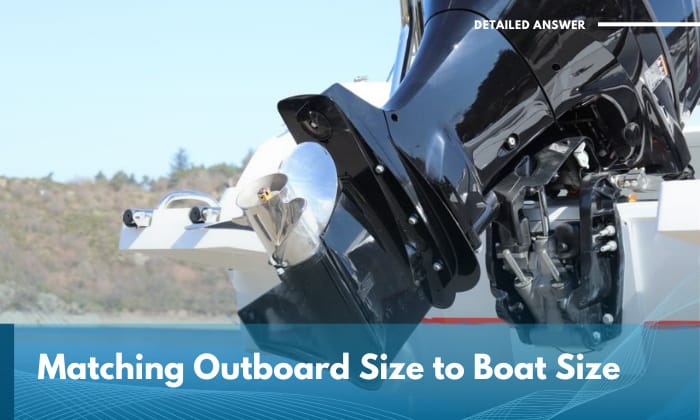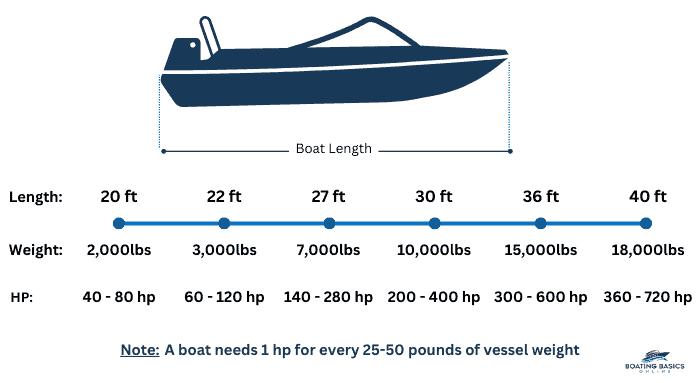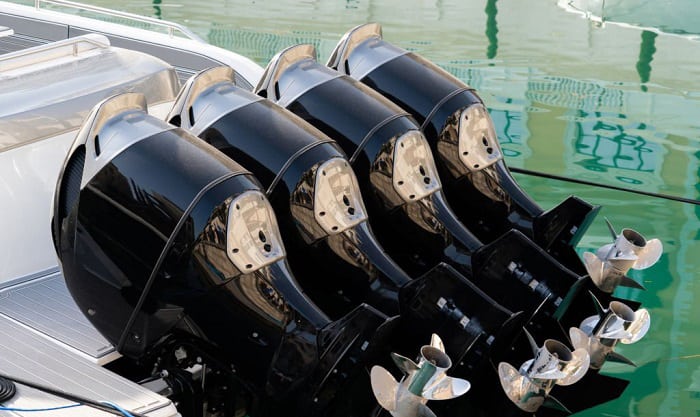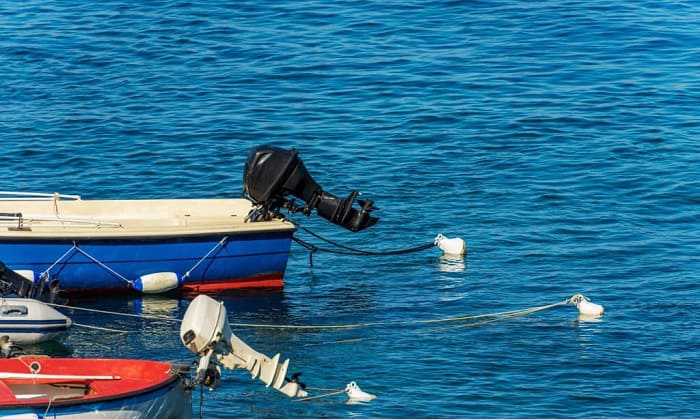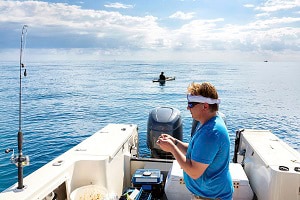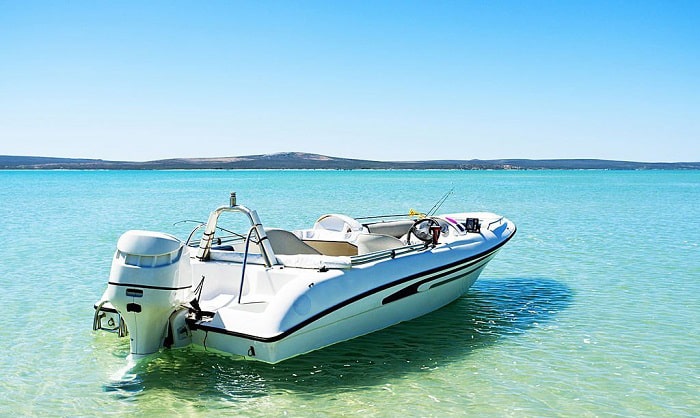Balance is a very important part of boating, from weight distribution to matching the proper equipment to each vessel. But what size outboard motor for what size boat should be used?
A boat needs one horsepower for every 25 to 50 pounds of vessel weight. This means a 20 foot boat weighing around 2000 lbs needs a 75 HP motor. We’ll look at the facts for choosing your motor size and using a boat motor size calculator.
Keep reading to learn more.
Table of Contents
Choosing an Outboard Motor for a Boat – Boat Size Vs Motor Size
Choosing the right boat engine size is crucial. An engine too small can result in sluggish speed. In contrast, a too-large motor can put too much pressure on the transom, resulting in vessel damage.
Then, how do you know the outboard motor size for your boat? Surprisingly, the answer can usually be found on a vessel’s capacity plate. If you can’t find this information on yours, you can rely on the boat’s length and weight to calculate the ideal engine size.
Below is a boat to motor size chart that shows the recommended horsepower for boats.
Boat horsepower chart:
| Boat Length | Boat Weight | Horsepower recommended |
| 20 ft | 2,000lbs | 40 to 80 hp |
| 22 ft | 3,000lbs | 60 to 120 hp |
| 27 ft | 7,000lbs | 140 to 280 hp |
| 30 ft | 10,000lbs | 200 to 400 hp |
| 36 ft | 15,000lbs | 300 to 600 hp |
| 40 ft | 18,000lbs | 360 to 720 hp |
How much HP does my boat need? Unfortunately, our chart can’t cover all boats since each model has a different weight, but we can work out estimates. By determining the boat’s weight, you can calculate the horsepower needed.
The ideal weight-to-power distribution is 25 to 50 pounds per horsepower. This means the heavier the boat, the higher the power needed to move it efficiently.
If you don’t know how heavy your boat is, you can rely on its length to get a rough estimate. In this case, it’s essential to pay attention to the material as well.
- For instance, a fiberglass 15 foot boat and 16 foot boat usually weigh around 1,700 pounds, meaning you should get an engine with a horsepower of 34 to 68.
- However, an aluminum 17 foot boat, despite being longer, will only tip the scale at 670 to 1170 pounds. In other words, the ideal motor size for this boat falls within the range of 26 to 46HP.
- Using the two examples above, a 50 HP motor would be a great fit for 15- and 16-foot boats made from fiberglass. However, it’ll be too big for the 17-foot one. This goes to show how important it is to take boat material into account.
Ideally, you should aim for the 25-pound-per-horsepower ratio (or the upper HP limit). This way, you can rest assured that the boat’s weight does not exceed the HP restriction when there are passengers onboard.
Things to Consider When Choosing an Outboard Motor
1. Four-stroke vs. two-stroke
Two-stroke engines are lighter and less expensive. However, given that they also consume more fuel, they’re not as economical in the long run. Although not as severe as in the past, modern two-stroke motors still release more fumes into the air than their 4-stroke counterparts.
Four-stroke engines, in contrast, have the advantage of being more silent and eco-friendly. This is why using these motors will give you access to more places, particularly environmentally sensitive areas. That said, these motors contain more moving parts and require more maintenance as a result.
2. Fuel type/power source
Consider what type of fuel you prefer when choosing your outboard. Gasoline is cheap and common but produces more pollution, while ethanol addresses the emission problem but at a much higher price.
Electric may also be a good choice depending on what you’re looking for in a motor. Models with enough power to serve as the primary propulsion of a boat have become available in recent years. These outboards are known to be costly but still worth considering.
3. Expected use
The primary purpose of the boat also affects what size of motor you’ll need. Cruising on the lake will let you get away with the lower limit of 50 lbs per horsepower, but engaging watersports such as waterskiing will require significantly more than that.
As another example, your motor needs would differ based on where you plan to fish. Staying in inland waters requires less power, whereas going out to sea will demand more.
Other factors to consider include the following.
- Number of motors
- Engine Mount
- Budget
- Warranty
- Local laws and regulations
Ways to Match an Outboard Motor to Your Boat Size
We’ve covered a lot of information, so how much horsepower for my boat is necessary? Here are two ways to match your boat size with the right outboard power.
1. Refer to the capacity plate
As stated above, the simplest and easiest way to match your vessel with the right motor is by referring to its capacity plate. Boats in the US are required to have one; on it, you will find essential information, including the maximum horsepower for your boat.
Referring to the limit means you won’t risk exposing yourself to dangers both at sea and with law enforcement. Learning the optimal HP also means you’re unlikely to underperform on the water.
2. Use an HP calculator
Another way of determining the right engine for a boat is by referring to vessel size. The easiest way would be to use a boat HP calculator to determine the right engine size. For this, you’ll need the different measurements of your craft, such as hull size and transom dimension.
The boat’s weight is one of the more important values when calculating horsepower. Even when two boats have the same length, they may weigh differently based on the materials used. An 18 ft aluminum boat would not be as heavy as a fiberglass vessel of the same length.
Frequently Asked Questions
How do you calculate the horsepower needed for a boat?
You can calculate the HP by using the recommended weight-to-HP distribution mentioned above – 25 to 50 pounds per HP.
For instance, you have a 5000-pound boat and need 1 HP per 25 pounds. As 5000/25= 20o HP, you’ll need to have a motor with 200 HP to operate the boat smoothly.
What if the engine is too big for a boat?
If an engine is too big for a boat, it probably has horsepower that exceeds that vessel’s HP limit. This is called overpowering and can lead to the propeller ventilating and losing thrust. It also exposes the stern to additional strain that could lead to hull damage.
It is also against the law to exceed this limit, so you should avoid overpowering to prevent running into trouble with the Coast Guard. Check your hp limit and a boat repower calculator before outfitting a new engine on any craft.
Conclusion
Now you have a better idea of what size outboard motor for what size boat, picking the right engine will be a piece of cake. However, I’d still recommend that you take time to consider your choice of outboard since this is an important investment that affects your safety on the water.
What do you consider most important when it comes to choosing an outboard motor? Tell us in the comments section below.
Remember to boat safely.
Furthermore, choosing the best motor size for your boat easy than ever when you learn more about the following articles:

“My intention from the first day establishing Boating Basics Online is to provide as much help as possible for boaters who want to experience a first safe and convenient trip. So feel free to join us and share your beautiful journeys to the sea!”

